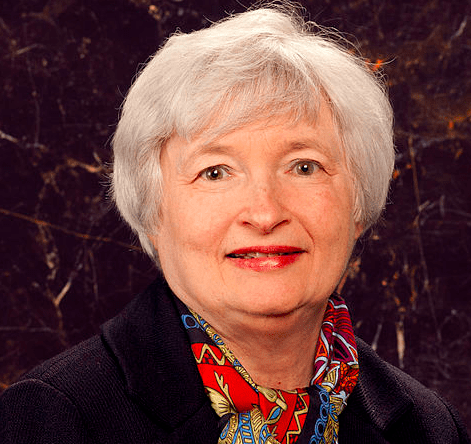Last week Janet Yellen was confirmed by the Senate to be the first woman to chair the Federal Reserve Bank, a position making her, according to one analyst, “the second-most-powerful person in the country.” She joins Christine Lagard, the first woman to head the International Monetary Fund, in guiding financial policies for the world’s most powerful nations.
As chair of the Federal Reserve, Janet Yellen is now a woman of extraordinary power. The Federal Reserve System, established in 1913, makes policy decisions without approval from the President or anyone else in any branch of government. Nor does Congress approve the bank’s funding and members of the Board of Governors serve terms that span presidencies and congressional terms.
This power comes with extraordinary responsibilities. The economy has been kept afloat by a large infusion of stimulus money, according to a plan that Yellen designed. Now she has the onerous task of tapering the stimulus without sending the economy into a new freefall. She must also implement the Dodd-Frank banking reforms that regulate financial organizations. Her predecessors believed strongly in allowing those institutions to self-regulate, but she has indicated that one of her “most important goals of the postcrisis period,” is to address the too-big-to-fail issue. She will have to balance the views of those who believe the law is burdensome and those who believe it does not go far enough.
Some argue she may be better-trained for the position than any previous office holder. Janet Yellen earned a bachelor’s degree in economics, summa cum laude, from Brown University and then earned a Master’s and Doctorate in economics from Yale. She taught at Harvard University and the London School of Economics. She worked at the Federal Reserve in the 1970’s and became a professor at the University of California, Berkeley. In the 1990’s she served on the White House Council of Economic Advisors under President Clinton. She then served as President and CEO of the Federal Reserve Bank in San Francisco. She warned early that the subprime meltdown was coming and would contribute to an inequality that would “undermine American democracy” unless the social safety net was strengthened. In 2010 she was elected vice president of the Federal Reserve.
Dr. Yellen’s academic research focused on the causes and implications of unemployment. She holds what Time magazine calls “the contrarian idea that low wages can actually increase unemployment.” She believes that unemployment is the country’s biggest problem at this time and her own research demonstrates that workers who feel underpaid are less productive. She supports a higher minimum wage and asserts that new economic policies must recognize that the last five years strained not only the economy, but individual families as well.
LEARN MORE:
Read about her confirmation: http://www.politico.com/story/2014/01/janet-yellen-senate-confirmation-federal-reserve-chairman-101800.html
QUESTION OF THE WEEK:
In your opinion, what is the most significant economic issue for women today?


Trackbacks/Pingbacks